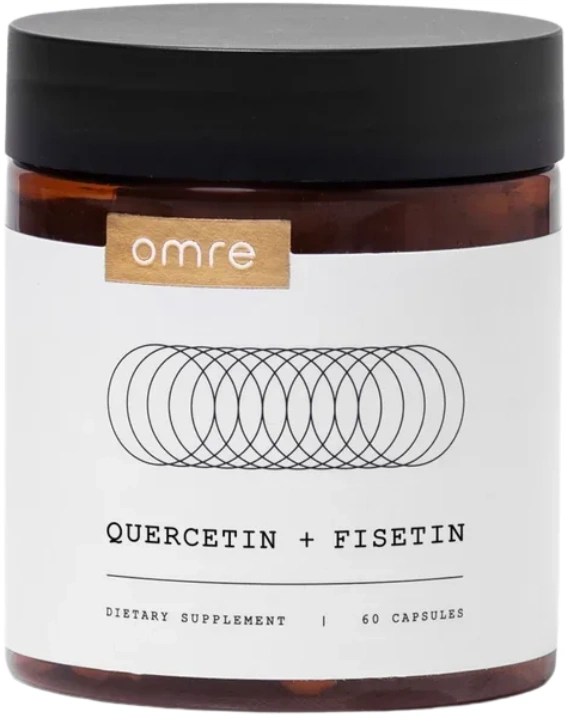What Happens When You Stop Taking NMN? Here’s Everything You Need To Know
Updated on Mar 3, 2026

Table of contents
- Why People Stop Taking NMN Supplements
- What is NMN and Why Is It Popular?
- Why You Might Stop Taking NMN Supplements
- What to Expect When You Stop Taking NMN
- How Long Does It Take for NAD+ Levels to Return to Normal?
- What's a Good NMN Supplement Alternative?
- Other Ways to Support NAD+ Levels
- Is NMN Right for You?
- Conclusion
- FAQs
When you stop taking NMN, your body will gradually adjust to the absence of this powerful molecule.
While NMN supplementation may support cellular energy and longevity pathways, discontinuing it might result in subtle changes (1).
For most people, the effects are mild and temporary, with NAD+ levels gradually returning to their baseline over time. Here's what you need to know about this transition.
Key Takeaways:
-
Stopping NMN causes NAD+ levels to gradually return to baseline within days or weeks.
-
Most users report mild effects like reduced energy or focus after discontinuation.
-
Common reasons people stop NMN include side effects, cost, or lack of noticeable benefits.
-
Lifestyle habits like exercise, sleep, and fasting help support NAD+ naturally after stopping.
Why People Stop Taking NMN Supplements
Some people stop taking NMN due to mild side effects, cost, or not seeing clear results. While NMN can support energy and healthy aging, it’s not a one-size-fits-all solution, and experiences vary.
For some users, sleep issues, digestive discomfort, or skin reactions make continued use difficult.
Others find the supplements expensive or feel the benefits aren't worth the investment. In many cases, people simply switch to alternatives like NR or focus on lifestyle changes that also support NAD+ levels naturally.
What is NMN and Why Is It Popular?
NMN (Nicotinamide Mononucleotide) is a naturally occurring molecule that fuels many essential processes in the body. It serves as a precursor to NAD+ (nicotinamide adenine dinucleotide), a vital coenzyme involved in energy production, metabolism, and cellular repair.
Why is NMN Making Waves?
-
Boosts NAD+ Levels: NAD+ levels decline with age, impacting everything from energy production to DNA repair. NMN supplementation may help replenish these levels (2).
-
Supports Anti-Aging: Animal studies suggest NMN may slow down aging and enhance cognitive function (3).
-
Promotes Metabolic Health: Early human trials indicate potential benefits, such as improved insulin sensitivity and aerobic capacity during exercise (4).
For instance, one study observed that postmenopausal women with prediabetes experienced better insulin signaling after 10 weeks of NMN supplementation (5).
Another trial showed that amateur runners taking NMN had enhanced oxygen intake and endurance (6). While human research is still evolving, these findings are promising.
Why You Might Stop Taking NMN Supplements

Based on the available research in humans, NMN has a low side effect profile. However, some individuals may choose to stop taking them for a few reasons:
Potential Side Effects
Like any supplement, NMN can cause mild side effects in certain individuals. These may include:
-
Skin Reactions: Some users report itching, redness, or mild rashes.
-
Sleep Disturbances: Difficulty falling or staying asleep has been noted, especially when taken later in the day.
-
Digestive Issues: Symptoms such as bloating, diarrhea, or abdominal discomfort may occur as your body adjusts.
-
Upper Respiratory Symptoms: A small number of users have experienced nasal congestion or mild respiratory irritation.
These side effects are often temporary but could be bothersome enough for some people to discontinue use.
Limited Research
While early studies on NMN show promising results, research in humans is still in its infancy. Some may prefer to wait for more robust clinical trials to confirm long-term benefits and safety.
Perceived Decline in Benefits
If you stop taking NMN, your NAD+ levels will gradually return to their previous state. As a result, you might notice a reduction in energy or other benefits linked to NMN, such as improved endurance or focus (7).
This could lead some individuals to pause supplementation if they feel the changes are no longer impactful.
Note: If you experience any side effects or concerns, it's always best to consult a healthcare provider to discuss your options.
What to Expect When You Stop Taking NMN
-v1753743196763.webp) When you discontinue NMN, your body undergoes subtle changes. Here’s what to anticipate:
When you discontinue NMN, your body undergoes subtle changes. Here’s what to anticipate:
Energy Dynamics
You might notice a slight dip in energy levels. NMN plays a role in ATP production—the energy currency of your cells. As your body adapts, this change is usually temporary.
Metabolic Adjustments
Without NMN, certain metabolic pathways may slow. While this might not be immediately obvious, it could affect how efficiently your body processes energy.
Resilience and Aging
NMN's anti-aging benefits stem from its role in cellular repair. Stopping NMN may lead to less efficient cellular maintenance, potentially impacting your body's stress response over time.
Immune Response
NMN supports immune function through energy production. While your immune system remains functional, it may adjust to lower NAD+ levels.
How Long Does It Take for NAD+ Levels to Return to Normal?
-v1737575842364-(1)-v1753742377283.webp)
After stopping NMN, NAD+ levels typically decline within days to weeks. The timeline varies based on age, lifestyle, and previous dosage.
Interestingly, research suggests that when NMN is taken orally, much of it is first processed by the gut microbiome and converted into other NAD+ precursors before being used by the liver and muscles. This means NAD+ production relies not only on NMN itself but also on normal metabolic and microbiome pathways. Once supplementation stops, these pathways simply return to their baseline activity (8).
Maintaining a healthy lifestyle can help bridge the gap as your body adjusts to life without NMN.
What's a Good NMN Supplement Alternative?
NMN supplements are generally safe and well-tolerated, making them a popular choice for those seeking to support energy levels and cellular health. However, if you're looking to explore other options, several alternatives can also help maintain NAD+ levels and promote overall well-being.
Nicotinamide Riboside (NR)
NR is another NAD+ precursor similar to NMN. It’s known for enhancing mitochondrial function, which plays a critical role in energy metabolism and healthy aging. Studies suggest that NR supplementation may improve endurance and support cardiovascular health (9).
NR is the precursor to NMN, which means it’s a very similar product. NR is a strong contender with robust scientific backing if you're considering switching.
Resveratrol
Resveratrol is a compound found in red wine and certain plants. It activates the SIRT1 gene, which boosts NAD production. Unlike NR and NMN, which are direct precursors, Resveratrol boosts NAD+ by increasing your cell's capacity to make more of it (10).
Often combined with NMN or NR, resveratrol helps amplify the effects of these supplements. Some research indicates that it may also provide cardiovascular benefits and help reduce inflammation.
Check out the best resveratrol supplement for you today.
Quercetin
Quercetin is a powerful flavonoid found in fruits and vegetables. Regarding anti-aging, quercetin has gained some interest as a senolytic. This means it may help the body clear senescent cells. Senescent cells are non-functioning cells that accumulate over time and fail to go through programmed cell death safely. That’s why they are sometimes referred to as zombie cells. (11).
For an upgraded experience, Omre Quercetin + Fisetin offers a potent combination designed to tackle cellular aging. With high-purity ingredients and a formula targeting senescent cells—often called 'zombie' cells, it supports cellular rejuvenation and overall vitality.
Although Quercetin and Fisetin are not NAD+ boosters per se, they target a different aging pathway that is equally important.
Other Ways to Support NAD+ Levels
-v1753743246248.webp) Supplements are effective, but lifestyle changes can also help support your NAD+ levels naturally. Here are some strategies to consider:
Supplements are effective, but lifestyle changes can also help support your NAD+ levels naturally. Here are some strategies to consider:
-
Exercise: Regular aerobic exercise can increase NAD+ levels and improve mitochondrial efficiency (12).
-
Intermittent Fasting or Caloric Restriction: Studies show that caloric restriction can enhance NAD+ production and improve metabolic health (13).
-
Healthy Diet: Focus on whole foods, vegetables, and unprocessed ingredients to support cellular function and maintain insulin sensitivity.
Adopting these habits can create a positive feedback loop for better energy and long-term health.
Is NMN Right for You?
As NAD levels decline significantly by the time you reach your 40s and 50s, many people opt to take NMN to boost levels back up. Although more research is required, animal and early human studies show a promising impact on the hallmarks of aging. However, as with any supplement, individual responses vary.
Consult a healthcare provider if you experience side effects such as skin irritation or digestive discomfort. They can help you adjust your dose, explore alternatives, or pause supplementation.
For those who find NMN isn’t the right fit, options like NR or quercetin can offer similar benefits.
Conclusion
NMN plays a vital role in supporting cellular health and energy, making it a popular supplement choice. However, if you choose to stop or explore alternatives, options like NR, resveratrol, and quercetin can help maintain your NAD+ levels and promote longevity.
Lifestyle changes, including exercise and a healthy diet, further support your overall wellness journey.
If you’ve decided to stop taking NMN, you’re probably wondering what to do next.
The good news? You don’t have to give up on supporting your cellular health.
Omre’s Quercetin + Fisetin gives your body another path forward, helping clear out old, damaged cells and support long-term vitality.
It’s made with high-purity ingredients, backed by science, and designed for people who want results without the guesswork.
Ready for a smarter, cleaner way to age well? Explore Omre Quercetin + Fisetin and feel the difference.
FAQs
What happens when you stop NMN?
Stopping NMN won’t cause withdrawal symptoms, but you might notice a dip in energy as your NAD+ levels return to their baseline. This could leave you feeling more tired, especially if NMN was compensating for an unhealthy lifestyle.
What are the negative side effects of NMN?
NMN is generally safe, but some users may experience mild side effects like abdominal discomfort, diarrhea, gas, or upper respiratory issues. A small 2021 study highlighted these effects, though they were not severe (14).
What happens when you stop taking NMN supplements?
Stopping NMN supplements leads to no withdrawal symptoms or adverse effects. The only change is a gradual decline in NAD+ levels over several weeks, returning to baseline levels.
How do you know NMN is working?
You may feel more energized and find it easier to stay active. Increased stamina and better focus are common early signs that NMN is positively impacting your body. The best way to know if NMN is working is to carry out biological age testing before and after taking it for several months. This is the most accurate way to objectively test its benefits.
Is NMN really worth it?
Studies show NMN supplementation boosts NAD+ levels, improves insulin sensitivity and enhances mitochondrial performance. Although more research is required, many users find these benefits make NMN a valuable addition to their wellness routine.

About the medical reviewer
Dr Pedram Kordrostami
Table of contents
- Why People Stop Taking NMN Supplements
- What is NMN and Why Is It Popular?
- Why You Might Stop Taking NMN Supplements
- What to Expect When You Stop Taking NMN
- How Long Does It Take for NAD+ Levels to Return to Normal?
- What's a Good NMN Supplement Alternative?
- Other Ways to Support NAD+ Levels
- Is NMN Right for You?
- Conclusion
- FAQs






